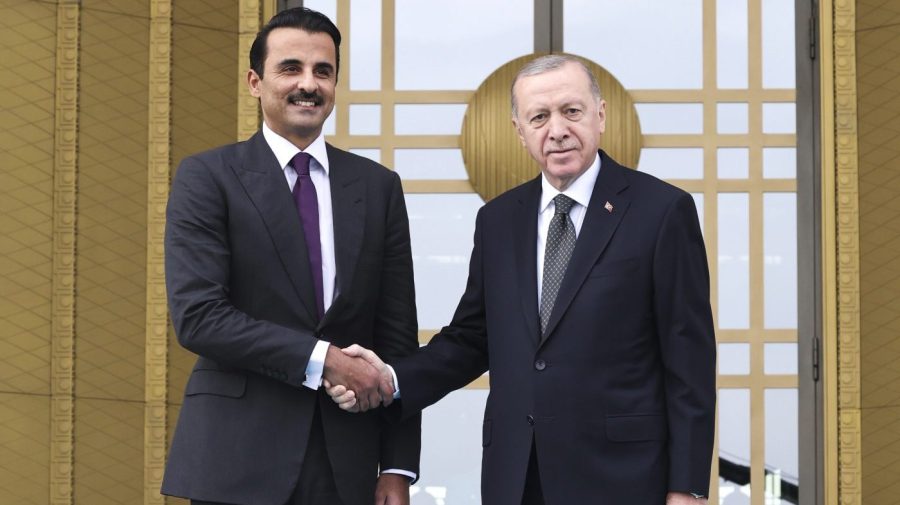
The Middle East is undergoing a profound transformation as new rivalries reshape its geopolitical order. For decades, the defining conflict in the region was a “cold war” between Iran and the Gulf Arab states, led by Saudi Arabia. This struggle, steeped in sectarian and strategic divides, fueled proxy wars and power struggles across the region.
Today, that longstanding rivalry is being eclipsed by a new competition. The collapse of the Assad regime in Syria and the rise of Turkey as a resurgent power have created a fresh dynamic — not just for regional dominance but also for leadership within the Sunni Muslim world.
Iran, recognizing the growing challenge posed by Ankara’s neo-Ottoman ambitions, is recalibrating its strategy, seeking detente and even entente with the Gulf monarchies to resist Turkey’s expanding influence. These developments illustrate the timeless logic of balance-of-power politics as regional actors adapt to shifting strengths and threats.
The fall of the Assad regime has shattered the Middle East status quo. Once a linchpin for Iranian power projection into the Levant and a key ally of Russia, Syria under Assad served as a critical buffer and as a conduit for Tehran’s influence. The regime’s collapse has left Syria fractured and destabilized, creating a vacuum that Turkey has eagerly moved to fill.
Under President Recep Tayyip Erdoğan, Turkey has adopted an assertive foreign policy, leveraging military, economic and ideological tools to expand its regional presence. From incursions into northern Syria to deeper involvement in Libya, Somalia and Qatar, Turkey has sought to position itself as a dominant regional player.
Erdoğan’s neo-Ottoman rhetoric, invoking Turkey’s imperial past, resonates deeply with his domestic audience but alarms other powers in the region. Ankara’s rise is not just a matter of military or political influence; it has reshaped the competition for leadership within the Sunni Muslim world. Saudi Arabia and its Gulf allies have long claimed this mantle, citing their stewardship of Islam’s holiest sites and immense financial resources. Turkey challenges this narrative by supporting political Islam and movements such as the Muslim Brotherhood, which the Gulf monarchies view as existential threats to their regimes. This ideological divide is deepening the geopolitical rift, as Gulf leaders see Turkey not merely as a rival but as a destabilizing force.
The Gulf-versus-Turkey rivalry is already playing out across multiple arenas. In Libya, Turkey’s support for the Tripoli-based Government of National Accord clashes with the UAE’s and Egypt’s backing of Khalifa Haftar’s forces. In the Horn of Africa, Turkey’s growing presence in Somalia has raised alarms in Riyadh and Abu Dhabi, which view the region as critical to their own security and influence. The 2017 Gulf blockade of Qatar, in which Turkey quickly intervened on Doha’s behalf, revealed the depth of mistrust between Ankara and the Gulf capitals.
Economic competition is further intensifying the rivalry. Turkey aims to position itself as a global trade hub, leveraging its location as a bridge between Europe and Asia. The Gulf states, however, are investing heavily in infrastructure and alliances to counter Ankara’s ambitions. This is not just a contest for influence but a broader struggle over the direction of power and development in the region.
Amid this shifting landscape, Iran is rethinking its approach. For decades, Tehran’s pursuit of regional hegemony put it in direct conflict with the Gulf monarchies, even prompting some Gulf Cooperation Council states to partner with Israel through the Abraham Accords. Now, Iran is redirecting its focus to counter Turkey’s rise.
Recent rapprochements, such as the detente between Iran and Saudi Arabia brokered by China, signal Tehran’s willingness to ease tensions with the Gulf. These agreements, although fragile, reflect a shared interest in containing Ankara’s neo-Ottoman ambitions. By easing hostilities with the Gulf, Tehran aligns itself — at least temporarily — with its former adversaries to blunt Turkey’s regional aspirations, highlighting Iran’s pragmatism as it seeks to navigate the structural conflict between the Gulf and Ankara.
This emerging rivalry carries far-reaching implications. Unlike the binary Gulf-Iran rivalry, this new dynamic is fluid and unpredictable, raising the risk of miscalculation. Turkey’s assertiveness could prompt a more formal coalition among the Gulf states, Israel and external actors like the U.S. and Europe. For the Gulf monarchies, the challenge is to balance the immediate threat posed by Turkey while addressing the lingering dangers posed by Iran. Deepening alliances, strengthening defenses and pursuing economic diversification will be essential for maintaining their position.
The stakes in this new competition are high, not only for the Middle East but for the global balance of power. The U.S., long the dominant external actor in the region, is shifting its focus to the Indo-Pacific, creating space for regional powers like Turkey to expand. Meanwhile, Russia and China are carefully positioning themselves in this new order. Russia’s relationship with Turkey, while pragmatic, could face strains if their interests clash in Syria or the Caucasus. China is strengthening ties with both Iran and the Gulf states, seeking to secure energy supplies and expand its Belt and Road Initiative.
The structural conflict between Turkey and the Gulf states represents a profound shift, with Iran playing a pragmatic role in countering Ankara’s ambitions. As these dynamics unfold, the region’s leaders face a stark choice: whether to navigate this transformation through creative diplomacy or to allow the shifting sands once again to bury hopes for stability and cooperation.
Andrew Latham is a professor of international relations at Macalester College in Saint Paul, Minn., a senior fellow at the Institute for Peace and Diplomacy, and a non-resident fellow at Defense Priorities in Washington, D.C.












